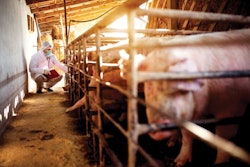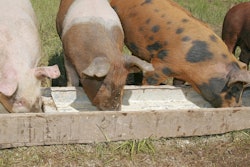
Authorities in Zimbabwe have suspended the import of livestock products from neighboring South Africa due to fears that the trade may lead to the spread of the African swine fever (ASF) virus to Zimbabwe’s pig population.
Announcing the restrictions this week was the Acting Chief Director of Zimbabwe’s Department of Veterinary Services, Dr. Pious Makaya, reports The Herald.
Stressing that neither disease had yet been detected in the country, he said the precautionary measures aim to protect Zimbabwe’s poultry and swine populations from avian influenza and ASF, respectively. Furthermore, monitoring and surveillance have been stepped up in order to prevent illegal imports through border checkpoints.
In the past, Makaya said, the Zimbabwean authorities have supported imports of the live animals in order to restock farms, and to improve genetic diversity.
According to the report, ASF returned to the southern African state in 2015 after a 23-year hiatus. The resulting spread of the virus caused the deaths of more than 750 pigs in two provinces, and brought substantial losses to pig farmers.
While ASF causes high morbidity and mortality in members of the pig family, the official stressed that it poses no threat to human health.
Between July 2015 and October 2019, Zimbabwean authorities officially confirmed 16 outbreaks of ASF to the World Organisation for Animal Health (WOAH).
Directly impacted were a total of around 5,760 domestic swine, including more than 1,280 mortalities. Affected were 15 village herds under multiple ownership in the northeastern province of Mashonaland Central, and one in Manicaland in the east of the country.
No further ASF cases in Zimbabwe have been notified to WOAH since 2019.
South Africa records 8 further ASF outbreaks
So far this year, South Africa’s veterinary agency has notified WOAH of eight more herds of domestic pigs infected with the ASF virus.
First of these outbreaks affected a herd of 86 animals in Eastern Cape. All the pigs there died in the first week of December.
Subsequently, infections were confirmed in three herds in Free State, two in Gauteng, and one in each of Limpopo and Western Cape. Three of the affected premises were described as “farms” — including herds of 210 and 918 pigs — while the others were village or backyard herds, each with no more than 47 animals.
The two most recently reported outbreaks began during the first week of February.
Based on WOAH notifications, there are four ongoing ASF outbreak series in South Africa. While one of these started almost five years ago, the most recent began in June 2023.
Cases have been confirmed at 283 locations across all nine provinces, according to these reports. Impacted by disease outbreaks have been almost 109,000 of the nation’s domestic pigs, including 29,400 that have died.
Latest overview of the global ASF situation from WOAH (dated January 29) puts the total number of ASF cases in domestic pigs across the African continent since January 2022 at 23,767 — the result of 146 outbreaks of the disease. Over this period, no outbreaks have been recorded in wild populations.
View our continuing coverage of the global African swine fever situation.

















